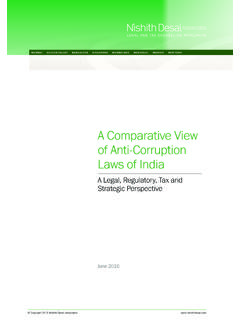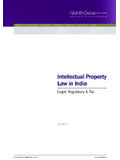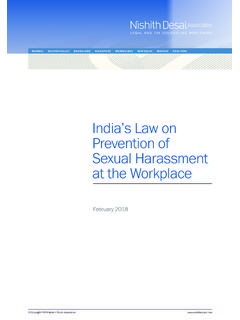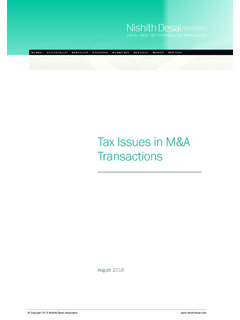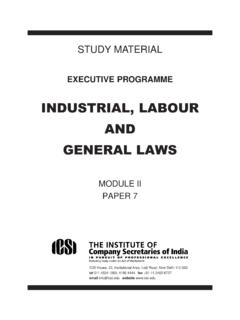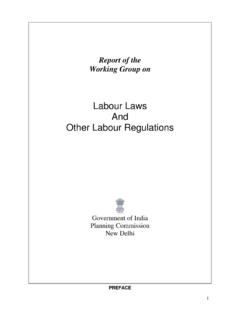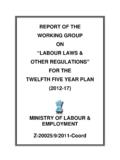Transcription of Labour and Employee Benefits - Nishith Desai …
1 And Employee BenefitsVolume 1T H E L A W A N D L E A D I N G L A W Y E R S W O R L D W I D E 20 1 0 / 1 1 Cross-borderCountry Q&APLCW hich lawyer?Lawyer profilesCountry Q&ALabour and Employee Benefits Handbook 2010/11 Volume 1 Country Q&A This article was first published in the PLCC ross-border Labour and Employee Benefits Handbook 2010/11 Volume 1and is reproduced with the permission of the publisher, Practical Law Company. IndiaVikram Shroff and Harshita Srivastava Nishith Desai OF LAWS1. Do the main laws that regulate the employment relationship apply to: Foreign nationals working in your jurisdiction? Nationals of your jurisdiction working abroad?The federal government and the state governments have enacted many employment laws . These laws can be broadly categorised as laws concerning: Training, recruitment and conditions of employment.
2 Employee compensation, social security, insurance and Benefits . Employment disputes. Anti-discrimination and anti-harassment. Trade these laws apply to an organisation and its employees depends on various factors, including the: Nature of the business or commercial activity. Office location. Number of the employees. Employee s title, role and responsibilities. Employee s base salary. For example, some laws only apply to workmen , who are spe-cifically defined under the Industrial Dispute Act 1947 (IDA) (see Question 17). laws applicable to foreign nationalsThe laws do not differentiate on the basis of an Employee s citi-zenship. Therefore, a foreign national working in an Indian com-pany is eligible to receive Benefits and protection similar to those applicable to an Indian citizen, under the relevant laws .
3 Indian laws will continue to apply irrespective of the choice of law in the employment contract. However, if a foreign national travels on a business assignment to india , but does not take up employment in india , the Labour laws may not apply. There is one exception. The mandatory participation of Indian nationals in the Employees Provident Fund and Miscellaneous Provisions Act 1952 (EPFA) is subject to a ceiling on base salary (see Question 20, Social security). However, a foreign national must contribute irrespective of his salary, subject to the terms of any social security agreement signed between india and the foreign national s home country. laws applicable to nationals working abroadAn Indian citizen that is working abroad but employed by an In-dian entity may not be able to claim all the Benefits of the Indian Labour laws .
4 Further, the Indian exchange controls provide a ceil-ing for grant of stock options by an Indian company to employees working abroad. However, certain provisions of the Employee s Compensation Act 1923 (ECA), which has been extended to workmen recruited by Indian companies but are working abroad, and the EPFA, will apply to an Indian national working abroad who is employed with an Indian company, irrespective of the choice of law. Indian Labour laws do not extend to Indian citizens who are work-ing in a foreign country and are employed by a foreign RESTRICTIONS AND INCENTIVES2. Are there any age or nationality restrictions on managers or company directors? If so, please give restrictionsOnly persons between the age of 25 and 70 can be appointed as a public company s managing director, full-time director or manager without government approval (Companies Act 1956 of india (CA)).
5 This age restriction does not apply to private restrictionsA non-resident individual cannot be appointed as a public com-pany s managing director, full-time director or manager (CA). A person is a resident of india if he has: Been staying in india for a continuous period of 12 months immediately preceding the date of his appointment as a managerial person. Come to stay in india either to: take up employment; or carry out business or a profession. Labour and Employee Benefits Handbook 2010/11 Volume 1 Country Q&ACountry Q&AFor more informationabout this publication, please visit about Practical Law Company, please visit restriction does not apply to private companies. In addition, less restrictive rules apply to public companies set up in a desig-nated special economic zone (SEZ), under the Special Economic Zones Act 2005.
6 Examples of leading SEZs include the SEEPZ SEZ in Mumbai, Kandla SEZ in Gujarat, MEPZ SEZ in Tamil Nadu, Falta SEZ in West Bengal and Noida SEZ in Uttar Are any grants or incentives available for employing people? If so, please give competition has developed over the past decade between various state governments to promote investment in their states. For example, some states, including Maharashtra, Karnataka, Andhra Pradesh and Tamil Nadu have introduced policies to pro-mote their IT and IT enabled services (ITES) sectors by offering incentives. Some of these policies require the employer to employ a minimum percentage of local persons from that state to take advantage of some of the PERMITS4. What permits do foreign nationals require to work in your country? Please explain: How these permits are obtained.
7 How much they cost. How long the process permitsForeign nationals require an employment visa (EV) to work in In-dia. EVs are generally issued to highly skilled and/or qualified professionals that an Indian company appoints on a contract or employment basis. india has recently re-defined its immigration laws and clarified the nature of activities for which an EV can be issued: IT and ITES sectors. To promote these sectors in india , EVs are only granted to skilled foreign nationals who are employed at a minimum annual salary of US$25,000 (as at 1 August 2010, US$1 was about ). Other sectors. The number of foreign nationals that an Indian company can employ in the company or project must be: no more than 1% of the total number of employees; and a minimum of five and a maximum of 20. india is yet to allow dual citizenship.
8 However, foreign nationals who hold a person s of Indian origin (PIO) or overseas citizenship of india (OCI) card can travel to india for the purposes of employ-ment without needing an the EV or stay in india is for a period of over 180 days, the for-eign national must register with a foreigner regional registration office (FRRO) within 14 days of arrival in permitsA foreign national can apply for an EV to his home country s In-dian consulate or embassy, that is, the country where either: His passport has been issued. He has been residing for at least two years prior to the date of application. The process for applying for an EV includes completing the visa application form and submitting certain documents, including: The employment offer letter. The appointment letter. A request letter from the Indian company.
9 Certain process for applying for FRRO registration includes completing the registration form and submitting along with the passport and EV: Employment documentation. Residence details. A letter or undertaking from the Indian fees for an EV application range between US$200 to US$800, depending on the country of application. No fee is required for FRRO registration, except in certain border of processAn EV can be granted within seven to ten working days. However, in certain cases, where the matter must be referred to the Indian government s Ministry of External Affairs, the deadline may be extended to six to eight months. The deadline can be extended further for foreign nationals from certain countries where a two-step review or approval process is OF EMPLOYMENT5. What terms govern the employment relationship?
10 In particular: Is a written employment contract or statement of employ-ment terms required? Are any terms implied by law into the employment contract (in addition to the terms referred to in Question 1)? Are collective agreements with trade unions or Employee representatives common (generally or in specific industries)? Written employment contractA written employment contract is not required. However: Certain states such as Karnataka and Delhi require the employer to issue an appointment order in the prescribed format. The appointment order must include the:Country Q&ALabour and Employee Benefits Handbook 2010/11 Volume 1 Country Q&AFor more informationabout this publication, please visit about Practical Law Company, please visit name and address of the establishment and the employer; name of the Employee and the Employee s postal and permanent address; Employee s: father s or husband s name; date of birth; date of entry into employment; job title.
